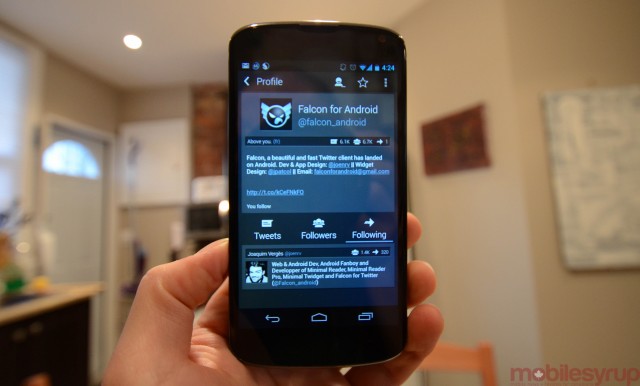
A terrible tale of an imperilled community has been writing its own conclusion over the past few days, likely signalling the beginning of the end for third-party Twitter clients.
Falcon Pro, a Twitter app developed by Joaquim Vergès, has become a victim of its own success. Twitter recently implemented a cap of 100,000 “tokens” per new third-party Twitter application, or double the number of users for existing Twitter apps with user bases above 100k. This has onstensibly cut off any chance at sustained revenue growth for developers looking to emulate the core Twitter experience. Tweetro for Windows 8 solved this by releasing a $9.99 version of its app when the free version reached the 100,000 token limit shortly after the release of Windows 8.
But what is a token? At face value, every time a user logs into a new Twitter app, it engages a token. Logging out and back in does not remove and reinstate the token, nor does logging onto the same app from multiple devices — for example, Twitter for iOS uses the same token per account on both iPhone and iPad.
Falcon Pro reached the 100,000 token limit this past weekend, cutting off access to new users; anyone who doesn’t already have a token for the app will be met with an error message when logging in. Vergès has the option of resetting his cache, which will work to force everyone to sign back into Falcon across all devices. But he doesn’t want to have to do this; ideally, he’d like to continue selling Falcon Pro to new users so he can earn a decent living from Android app development.
On a recent Google+ Hangout between the developers of several popular Android Twitter apps, Falcon Pro, Carbon for Twitter, Tweetings and Tweedle, Vergès expressed his anguish at the still-rampant piracy problem on the platform. Of the 100,000 tokens used, he says, only 40,000 were taken by paid users. The others were a combination of refunded apps and pirated versions of Falcon Pro. He says that, even on the latest versions of Android, it is incredibly easy to use on-device tools to strip the licensing from a paid .APK file, repackage and install it.
Android piracy is tarnishing the Play Store brand and is forcing developers to use invasive methods of licensing enforcement, such as doing a server-side check every time the app opens. Without an internet connection, the check will fail and the app will not open. This was an issue for me when I went travelling in early 2012, as I had neglected to open each app and game I wanted to use prior to leaving Canada. Vergès said he doesn’t want to implement such a check, but may be forced to play cat and mouse with the various hacking tools for a while to be able to sell his app again.
While this may be the end of Falcon Pro in its current state, it’s not going to be the end of stories around Android piracy ruining the party for the rest of us. Pirates are more often than not users who would never have purchased the software in the first place, but in this instance they are using up resources that are not monetary.
Twitter doesn’t look like it’s going to reverse its token distribution decision any time soon — Vergès wrote on his Twitter account today, “Twitter emailed me. They refuse to extend the token limit because Falcon doesn’t provide any features that their app doesn’t have already…” This means that if developers want to continue to create great third-party Twitter apps, they’re going to have to charge more and, ideally, get in front of piracy. Google will need to work on the latter part, too, but there’s only so many ways to plug a sieve.
MobileSyrup may earn a commission from purchases made via our links, which helps fund the journalism we provide free on our website. These links do not influence our editorial content. Support us here.


